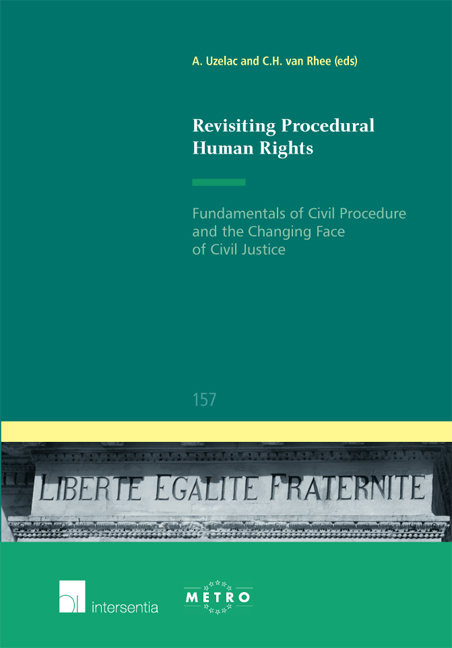 Revisiting Procedural Human Rights
Revisiting Procedural Human Rights from Fundamental Procedural Rights from a National Angle
Published online by Cambridge University Press: 13 October 2018
Introduction
Pre-bankruptcy settlement proceedings can be characterized as quasi-collective proceedings under the supervision of a court or an administrative body that give a debtor in financial difficulties the opportunity to restructure at the pre-insolvency stage and to avoid the commencement of insolvency proceedings in the traditional sense. An overview of the latest developments in the field of pre-insolvency procedures across Europe suggests that the economic crisis has motivated a number of European states to reform and improve their laws aimed at improving restructuring options, among other things by encouraging pre-bankruptcy (or preinsolvency) settlement proceedings. It can be argued that development of legislation of such or similar proceedings is the result of the fact that the existing legal framework for bankruptcies did not meet the challenge of the economic crisis which calls for achieving better economic results than those that might be achieved under the liquidation process, immanent in traditional bankruptcy. Also, there is little doubt that Chapter 11 of the US Bankruptcy Code, which is frequently referred to as a ‘reorganization’ bankruptcy, has served as a model for European countries to modernize their laws.
Similar to the economies of some other European states, Croatia's economy has been seriously affected by the economic crisis. From 2008 to date, the already high level of illiquidity shows signs of further and constant increase, thus remaining one of Croatia's main economic problems. In order to address this problem, in 2012 the Croatian government decided to introduce new legislation that would force certain businesses, facing financial difficulties, to try and settle their liabilities by applying for the first stage of pre-bankruptcy settlement proceedings with one of the country's financial agencies.
As can be read in the explanatory memorandum of the Draft of the Act on Financial Operations and Pre-Bankruptcy Settlement (AFOPS), the Croatian government's main intention was to enable certain debtors to restore their liquidity and solvency. As envisaged by the government at the time of its delivery, the Act should result in better cash flows between enterprises. The idea was also to give a boost to the market by pressing companies to enter pre-bankruptcy settlement proceedings and to ensure continuation of business activity for successful businesses. Lastly, the expectations of the Croatian government while drafting AFOPS were that it would save many jobs and maybe even finally change negative trends in the jobs market.
To save this book to your Kindle, first ensure [email protected] is added to your Approved Personal Document E-mail List under your Personal Document Settings on the Manage Your Content and Devices page of your Amazon account. Then enter the ‘name’ part of your Kindle email address below. Find out more about saving to your Kindle.
Note you can select to save to either the @free.kindle.com or @kindle.com variations. ‘@free.kindle.com’ emails are free but can only be saved to your device when it is connected to wi-fi. ‘@kindle.com’ emails can be delivered even when you are not connected to wi-fi, but note that service fees apply.
Find out more about the Kindle Personal Document Service.
To save content items to your account, please confirm that you agree to abide by our usage policies. If this is the first time you use this feature, you will be asked to authorise Cambridge Core to connect with your account. Find out more about saving content to Dropbox.
To save content items to your account, please confirm that you agree to abide by our usage policies. If this is the first time you use this feature, you will be asked to authorise Cambridge Core to connect with your account. Find out more about saving content to Google Drive.